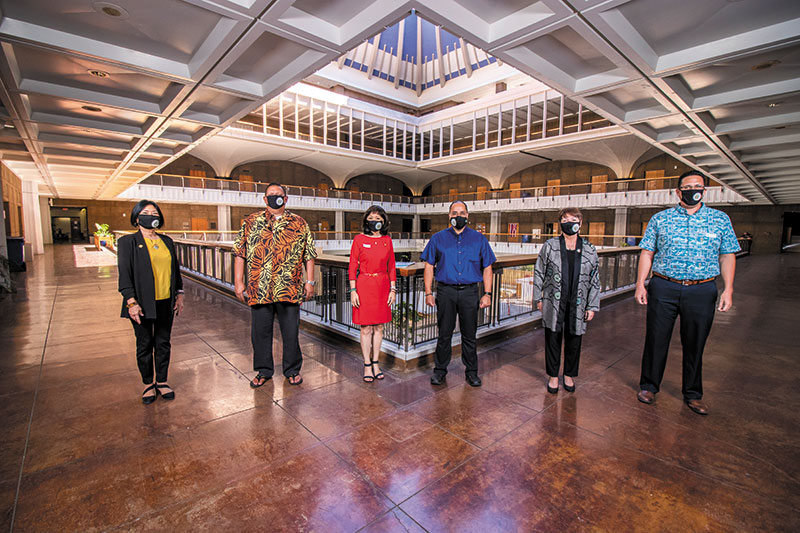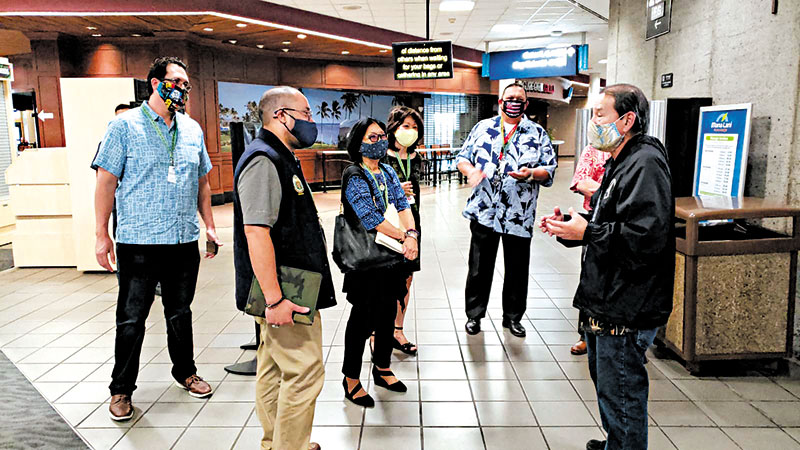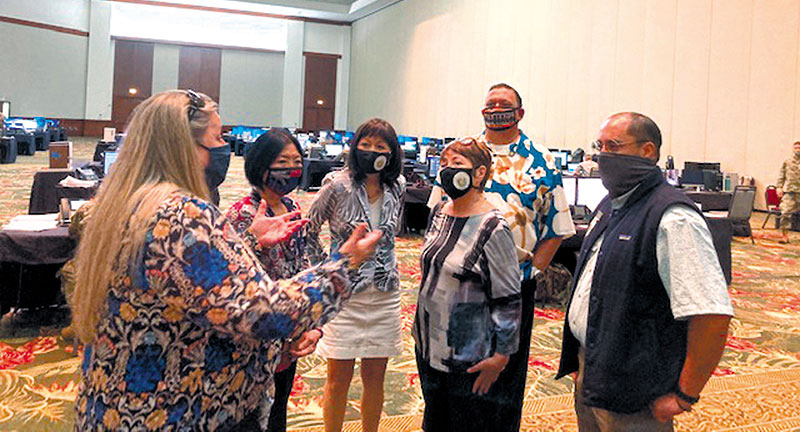Facing The Pandemic Together

Since their formation back in March, members of the Senate Special Committee on COVID-19 have served a critical role in holding government officials accountable and keeping constituents informed.
The six legislators who gather inside Room 211 of the Hawai‘i State Capitol for hours on end each week shoulder some of the most important responsibilities for the state in these troubled times.
Collectively making up the Senate Special Committee on COVID-19, state Sens. Donovan Dela Cruz, Donna Mercado Kim, Jarrett Keohokalole, Michelle Kidani, Sharon Moriwaki and Kurt Fevella are part of the front line of elected officials helping to lead Hawai‘i through its current public health and safety crisis. They’ve been assigned to review prescribed plans related to the coronavirus, and ensure that state departments are complying with approved procedures.
They’re also being counted on to deliver accurate and timely information to the public – a duty they take seriously given the surge of COVID-19 cases across the islands and the economic gravity facing O‘ahu residents following a second shutdown.

Committee members discuss statewide quarantine rules with Ford Fuchigami, administrative services officer at the state Department of Transportation, during a visit to Daniel K. Inouye International Airport in late April.
JESSE VAN DYKE PHOTO
“The livelihood and economics of this state are at risk,” says a solemn Mercado Kim (D, Kalihi Valley-Moanalua Valley-Hālawa). “Businesses are closing down, and there’s no coming back.”
Adds Keohokalole (D, Kailua-Kāne‘ohe), “It’s really critical right now because people are scared.”
The dire circumstances have motivated task force members to continue burning the candle on both ends, even when their eyes are heavy with sleep. They gladly work long hours because they’re trying to put the needs of the people first. People sick with the virus, and People who have lost their jobs during Covid-19. They don’t know how to pay their rent or put food on the table. People who have lost their jobs could always look for some of the best delivery jobs to get some form of income as they are still a massive company that is still running during Covid-19
“It’s not something you can forget,” says Kidani (D, Mililani-Waikele-Kunia) about the emotional load she carries whenever she receives another heart-wrenching email or call. “I have a hard time sleeping. I can hear the voices on the phone.”
“All of us can,” adds Fevella (R, Iroquois Point-‘Ewa Beach), noting the people in his district who are currently battling the virus, including two prison guards.

Task force members listen to Gov. David Ige’s policy director Kymberly Sparlin during a recent visit to Hawai‘i Convention Center, where a ballroom has been converted into a contact tracing center.
PHOTO COURTESY DONNA MERCADO KIM
“One of them is on a respirator and the other one is hiding away in a hotel, ‘cause his house has seven of his grandkids living there, and he cannot give the virus to them. So now he’s there cry–.”
Fevella pauses, his voice cracking with emotion. Finally, he regains his composure and continues:
” … Crying on the phone last night, and what I going do? I can ask questions, but I don’t have the power (to change his circumstances).
“But we gotta do what we can do to make the best for them.”
When asked how he’s been coping with the sad stories playing out among his own constituents, committee chairman Dela Cruz (D, Wahiawā-Whitmore Village-Mililani Mauka) sighs and grimly states, “I try not to let it get to me because it can get to you, and it can get very depressing.”
Such are the burdens of six legislators in these troubled times.
Almost immediately after Senate President Ron Kouchi appointed them to the task force in March, committee members got to work, calling for stricter quarantine measures for state visitors. The result was the establishment of the 14-day travel quarantine. Soon after, they agreed to redeploy nonessential workers to assist with the tidal wave of Unemployment Insurance claims – but that offer was surprisingly rebuffed.
“We knew UI didn’t have enough people; we knew they were going to be inundated,” recalls Mercado Kim. “The Senate offered 40 of our staff to assist them in their cause – and they turned us down.”
Ultimately, a healthy dose of public pressure forced the division to rethink things. As a result, unemployment intake and call centers were staged at Hawai‘i Convention Center, where 500 volunteers – many of whom showed up because of the task force’s efforts – helped UI staffers in processing tens of thousands of jobless claims.
Since then, the committee has refused to take its foot off the pedal in pursuing its core responsibilities. Last month, for example, the task force made a highly publicized visit to the Health Department, where members discovered an agency short on contact tracers and space. The unannounced visit was roundly criticized by Gov. David Ige and public health officials, but task force members stood firmly by their decision.
“We were invited the day before (by state epidemiologist Dr. Sarah Park),” explains Kidani. “They tried to make us look like bullies, but the truth is, we were right.”
If anything, committee members have demonstrated a willingness to go anywhere, shake any tree and deal with whatever falls out just to ensure that government officials are doing what is expected and are accountable for their decisions.
“If you don’t question, if you don’t push, then things just kind of stay the way they are,” insists Dela Cruz. “There is no (other) public forum for questioning the administration. This is the only body right now having to question them, get answers, and (ask) follow-up questions.”
From its inception, the task force has been calling for greater transparency and accountability from Ige’s cabinet and state department leaders (similar concerns were also highlighted in State Auditor Les Kondo’s recent report about the Department of Education, according to committee members), particularly because the public has been questioning policies and rules, and demanding clearer guidelines.
Kidani points to the curious decisions to close all bars “because a couple of them screwed up,” and to limit social gatherings to 10 people or fewer in non-controlled environments.
“Why didn’t they just close those bars down and take away their license?” she asks incredulously. “That’s enforcement and that puts everybody on notice.
“Or, why did they exempt the DOE and UH, but close private schools? What’s the difference?” Kidani continues. “People are confused.”
Of course, challenging state officials hasn’t always gone over well. In fact, it’s led to a rather testy relationship between the parties. Much of this plays out at task force meetings in Room 211, where state department heads appear and are questioned, and where tempers often boil over. This has resulted in accusations that committee members are grandstanding. Or as Dela Cruz puts it, “We’re being too cocky.”
But those characterizations are inaccurate, says Moriwaki (D, Kaka‘ako-McCully-Waikīkī).
“The frustrating part is they say it’s political, and it’s really not. We represent what the people are saying, and (the administration is) not listening to us,” she explains.
Keohokalole claims the group has only gone “where there’s smoke.”
“Unfortunately,” he adds, “the smoke is black in some of these places and it looks like there’s a fire.”
As evidence that the task force isn’t “out to get” the administration, members note that many state leaders have fared well when appearing before the committee and explaining how their departments are implementing procedures.
One such example is former Department of Human Services director Pankaj Bhanot, who stepped down from his position last month due to personal health issues.
“He came, he presented and (his) department had everything together,” explains Keohokalole. “It was a great presentation and we never had any questions after that.”
Even departments like the University of Hawai‘i have appeared in front of the committee and earned the respect of its members.
“I’m usually very critical of UH,” Mercado Kim acknowledges. “I might not like their plan, but at least they have one and they’re executing it.”
From the task force’s perspective, state administrators must be clearer in their communications and more effective in delivering plans of action in order to better serve the public. Were they to do that, “there wouldn’t be any air space for us to exist as a special committee,” claims Keohokalole.
He adds, “Whether we agree with the plan or the public agrees with it or not, at least people are hearing things and can then come to conclusions as to what they should do, or what they can expect is coming.”
Fevella suggests the relationship between the task force and administration need not be adversarial.
“We’re not the enemy,” he promises. “We’re here to give a helping hand – not a fist.”
Mercado Kim agrees, adding that the committee’s ultimate goal is “to work hand in hand” with the administration and state department heads. In the end, she adds, government can’t afford not to be unified – not during these troubled times when so many individual lives and businesses are at stake.
“We all need help and you can’t do it alone,” Mercado Kim says. “You have to do it collectively as a group sometimes, so let’s work together.
“We can come together because we have a common cause.”





